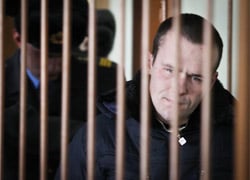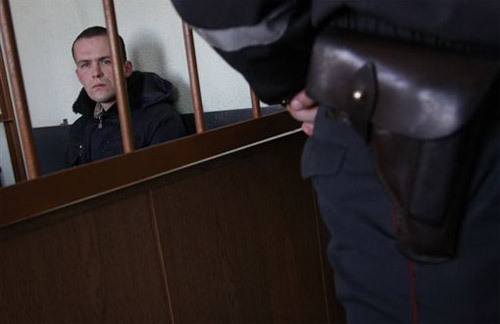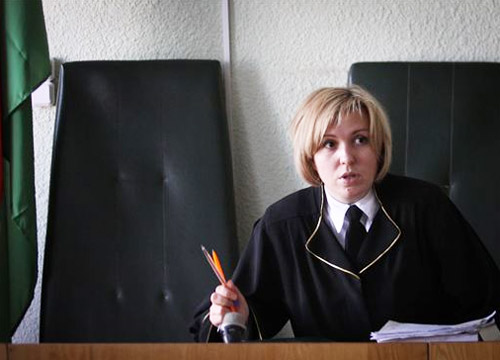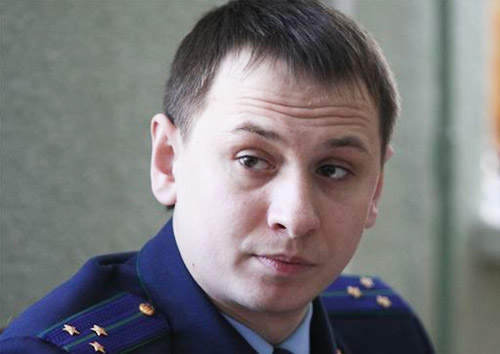First sentence for Square: 4 years in maximum security colony
335- 17.02.2011, 17:52

Vasil Parfyankou, an activist of Uladzimir Nyaklyaeu’s election team, has been sentenced on February 17.
As BelaPAN news agency reports, the first trial in the case of mass riot in Minsk on December 19, 2010, has been held today’s morning in the court of the Frunzenski district of Minsk.
Vasil Parfyankou, an activist of Uladzimir Nyaklyaeu’s campaign, was accused under part 2 of article 293 of the Criminal Code (taking part in mass riot). He may have been faced from 3 to 8 years of imprisonment.
Vasil Parfyankou partially admitted his guilt, he said he had taken part in a demonstration on Independence Square in Minsk on December 19, but he hadn’t broken the windows.
Parfyankou also said former presidential candidates Vital Rymasheuski, Andrei Sannikov, and Mikalai Statkevich had rather successfully calmed down the people breaking windows in the House of Government. According to the defendant, people began to disperse after their appeals.

As judge Volha Komar says, the sum of damage to the House of Government at the demonstration was 14 million Belarusian rubles.
Journalists were admitted to the courtroom. Court officers warned photographers and operators against taking photos and video during the trial. The judge also banned filming and taking photos in the courtroom. She asked the journalists who didn’t find vacant seats to leave.
As human rights activist Ales Byalyatski said on the air of Euroradio, the courtroom had only 40 seats, so many people were not able to get inside. The trial was attended by foreign and Belarusian journalists (both official and independent) and people who came to support the activist.
The prosecutor demanded six years in maximum security penal colony for Vasil Parfyankou. Prosecutor Anton Zaharouski considered the guilt of Parfyankou was proved during the investigation, he was guilty in a criminal offence under part 2 of article 293 of the Criminal Code of Belarus (taking part in mass riot).
The court found Parfyankou guilty of participating in mass riot in Minsk on December 19 and sentenced him to 4 years in a maximum security penal colony.
The sentence hasn’t come into force and Parfyankou has the right to appeal against it to a higher court within 10 days.
Under a civil suit, Parfyankou is also obliged to pay over 14.048 million rubles (approximately 4,700 dollars) within a month upon entering the sentence into force. This sum was allegedly spent on repairing the broken windows and doors of the House of Government and revive the green plantation near the building.
The prosecutor said at the trial that “the defendant took active part in mass riot on Independence Square in Minsk, tried to enter the House of Government forcefully, blew at least 61 hits on the façade, and disobeyed to police officers.”
The prosecutor asked in his final word to take into account that Parfyankou, had served punishment before and had an unspent conviction.
Parfyankou had a previous conviction over article 218 of the Criminal Code of Belarus “intentional destruction of or damage to property”. He was sentenced to three years of imprisonment and released on parole.
Vasil Parfyankou has attended opposition demonstrations for ten years. He was among the activists who protected Kurapaty memorial complex. He was an activist of Uladzimir Nyaklyaeu’s campaign in the latest presidential elections. “He is an active citizen,” Ales Byalyatski said about Vasil Parfyankou.
“The first trials appear to be the easiest for judges and investigators. They started with ordinary participants,” Ales Byalyatski gives his opinion on why Parfyankou was tried first. “These trials, these court decisions, evidence of witnesses and participants of proceedings will be taken as a basis of accusations of those, who are considered organizers of mass riot. They will be tried the last.
I think the witnesses, whom we heard this time, won’t be heard again. In general , prosecutors will build prosecution taking into account the first trials. It’s a well organized process. It was brought to perfection under Stalin in considering group cases. At first ordinary participants were tried, them the so called organizers stood trials. So, this process is used now.”

Judge Volha Komar

Prosecutor Anton Zaharouski









